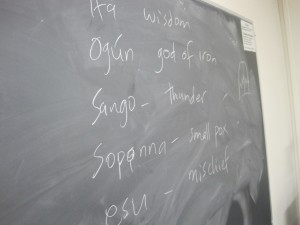Q: How do I prepare for teaching class, usually?
A: I don’t.
 Well, that’s not true, technically. It’s just a short response. I spend all waking hours, especially at weekends usually mentally mapping the format of the next class that by the time it’s Saturday evening, I’m in an almost panic mode, worrying whether I’ve done enough even though I’ve been noting things down and recalling examples that could help pass the messages across better. But I don’t study much just for the class. I follow relevant links that I find online or offline, and I follow up on new and old leads. Yesterday I looked through the first chapters of Je Ká Ka Yoruba, the text for the language teaching again, and tried to see if there was something there that I hadn’t seen before or taught before. I needed to cover much of the weekly syllabus because of the Martin Luther King holiday that fell on Monday, effectively reducing my week by half.
Well, that’s not true, technically. It’s just a short response. I spend all waking hours, especially at weekends usually mentally mapping the format of the next class that by the time it’s Saturday evening, I’m in an almost panic mode, worrying whether I’ve done enough even though I’ve been noting things down and recalling examples that could help pass the messages across better. But I don’t study much just for the class. I follow relevant links that I find online or offline, and I follow up on new and old leads. Yesterday I looked through the first chapters of Je Ká Ka Yoruba, the text for the language teaching again, and tried to see if there was something there that I hadn’t seen before or taught before. I needed to cover much of the weekly syllabus because of the Martin Luther King holiday that fell on Monday, effectively reducing my week by half.
Before I went to bed at 3am on Sunday night, I managed to read the first chapter of A Mouth Sweeter Than Salt for the very first time in one sitting. Last semester, I had only just glanced through that chapter because I had too much to read then. I got much of the ideas of it from the students’ summaries and what we discussed in class. Lazy, I know. But after reading it yesterday, I understood why anyone could be forgiven for trying to avoid reading it. For an avid reader, each sentence is a treasure of lore. It tells of some thing or the other that the author has either not talked about before earlier, or that he wants to say again in another way. I agree, the chapter could have been a little shorter, but you should read it. You should read it. It brings memories of things parents talk about. Reading it, I felt like I was listening to a seasoned elder speak of his childhood in a closely knit extended Yoruba family. If I could meet the writer, I would ask him too many questions. Or I would just sit at his feet, just listening to him talk. He is a good writer. He’s a good story teller too. Why is this book not read in Nigerian schools? Oh, I forgot, Wole Soyinka’s Ake has already taken control of that spot in autobiographical narratives in colonial and pre-colonial Nigeria. Their experiences are not the same, but they are similar, as I pointed out in class, lest they get the idea that everyone of us in Nigeria – just like this writer – do not know our exact date of birth. Alright, go and get the book, and read.
There is nothing new I want to tell you about today’s class. It stated on time and it ended on time. No other student has dropped off beside Gretchen who had dropped out after a first class. She left us for a class in Finance, so we’re nineteen now. Still, the textbooks are not sufficient. Many will have to share. We can’t complain. Now we can greet, introduce ourselves, respond in Yoruba and ask few introductory questions in Yoruba as well. It’s a start. These students are more agile, a little faster to learn than the last ones. I think. I could be wrong. They got the “kp” and “gb” far easily, for sure. Maybe it is because of the size of the class that gives this positive feeling and active participation. It is turning out to be a blessing after all. We may not be able to joke around as much as we did last semester, but we will try. I may find it harder to learn everyone’s names on time as I want to. It will take a while, but I’ll get there. Today we met esu, ifa, Obatala, and Sango. Next week, we’re meeting Wole Soyinka, and maybe later Suzanne Wenger. Maybe it’s not a bad idea to have such a large class. It feels warm enough. I love it.
I think that the most memorable thing I have found as a pattern is that I usually wake up early whenever I have to teach a class, notwithstanding when I go to bed. It’s a good thing. Maybe that’s why I’m tired on Thursdays…
7 Comments to What Else Is New? so far. (RSS Feeds for comments in this post)